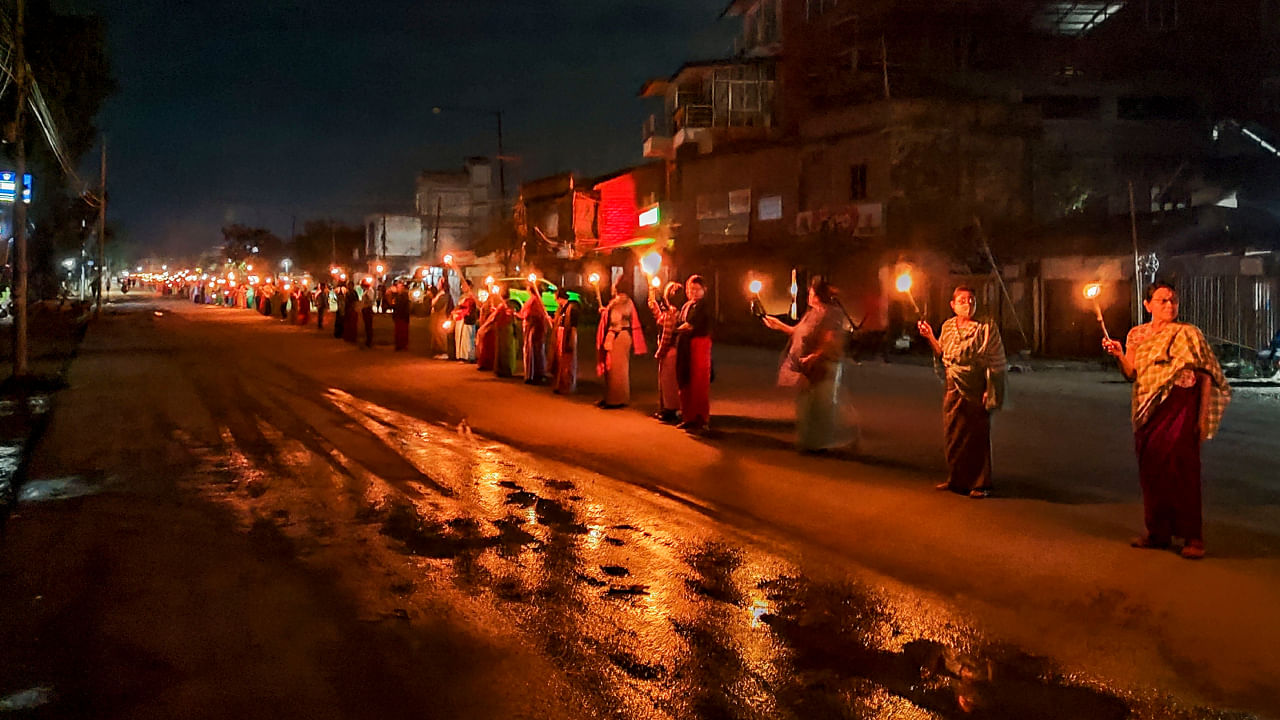
Women form a human chain to protest against the ethnic violence between Meitei and Kuki community people in Manipur.
Credit: PTI Photo
The Manipur government is racing against time to complete the first batch of prefabricated houses to shelter 3,000 families displaced by the ethnic violence so that they can shift from relief camps.
Many of those affected by the strife have been sheltering in the temporary relief camps for more than three months.
Superintendent of Police P Brojendro of Manipur Police Housing Corporation Limited, which is undertaking the project, told PTI, 'The construction began from June 26 onwards in five different places and we are racing against time to complete the state government's initiative as soon as possible.'
Noting that 200 houses being built near Sajiwa Jail in Imphal East district is nearing completion, the official said that each house will have two rooms and a toilet and there will be common kitchens, while ten houses will form a row.
Around 160 labourers are working to complete the 200 prefabricated houses, the deadline for which is August 20.
'Materials used for constructing these houses include puff panel for walls, powder-coated aluminium frame for windows and pre-painted CI sheets for roofs,' he said.
'The greatest challenge of transporting these materials into Manipur was blockades on the highways of the landlocked state,' he said.
He said labourers for assembling the houses were brought in by flights while the foundation was done by local workers.
Prefabricated houses for at least 400 families are being built in the Yaithibi Loukol area in Thoubal district, and another 120 at Kwakta in Bishnupur district.
Similar houses are also being built at Sekmai in Imphal West district and Sawombung in Imphal East.
'Completion of the houses, particularly at Kwakta, faced setbacks due to consistent exchange of fire between unidentified people and state police,' another senior official said.
'The prevailing law and order situation in the hill areas proved it extremely difficult to implement the project there,' he said.
The internally-displaced people (IDPs), who will be celebrating Independence Day in their makeshift shelters, feel shifting to the newly constructed houses is a good move but yearn to return to their homes from where they had to flee when riots broke out.
Kishorjit P, one of the IDPs who stays at a relief camp in Imphal East district, said, 'I will not shift to the prefabricated houses. I want to return to Churachandpur from where we had to flee. Of course, proper security arrangements have to be taken. I was born and raised in Churachandpur and have an emotional attachment to my ancestral place.'
Another IDP, Ranjita S, however, said she was looking forward to shifting to the new place of residence.
'We cannot live in relief camps forever. At some point, we need to start afresh. These prefabricated houses will be the first step to a new life,' she added.
Notably, more than 160 people lost their lives and several hundred were injured since the ethnic clashes broke out in Manipur on May 3 after a 'Tribal Solidarity March' was organised in the hill districts to protest the Meitei community's demand for Scheduled Tribe (ST) status.
Meiteis account for about 53 per cent of Manipur's population and live mostly in the Imphal Valley. Tribals -- Nagas and Kukis -- constitute little over 40 per cent and reside in the hill districts.